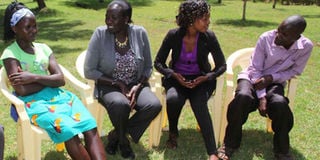Garissa varsity attack survivors put ordeal behind them

Survivors of the Garissa University College attack talk about their ordeal during an interview in Uasin Gishu County on March 30, 2017. PHOTO | JARED NYATAYA | NATION MEDIA GROUP
What you need to know:
- A student said some of the survivors of the attack have found it difficult to cope with life on campus due to unfulfilled pledges.
- But Moi University’s Dean of Students said the majority of the students who transferred there after the attack have recovered well.
Three years after the April 2, 2015 terror attack at the Garissa University College that left 142 students dead, some of the survivors remain traumatised but others are moving on with their studies.
After the deadly attack by members of the Somalia-based terror group Al-Shabaab on April 2, 2015, the college was closed and students moved to Moi University main campus, its parent institution then.
Some students said they are dissatisfied with the treatment they have received since being transferred there, but others said they were happy with their recovery and the support they have received from the university administration.
However, the students who spoke to the Sunday Nation requested that we do not reveal their names because some of their colleagues were harassed in the past by the university administration for speaking about their stay in the campus.
“At first, the institution demonstrated care by offering counselling but after some time we were left on our own,” said a student who survived the attack.
TRAUMA
She added: “Some of us cannot withstand the huge crowd at this university. It evokes memories of the attack but we have to persevere and complete our studies since you cannot cling on the past.”
Another student said some of the survivors of the attack have found it difficult to cope with life on campus due to unfulfilled pledges.
“We were assured of accommodation and meals but nobody cares for us,” she said.
The survivors have formed a support group. Recently a non-governmental organisation met them to check on their progress and they had lunch together.
A survivor of the attack was full of praise for the fellow students and their leaders whom she said have been supportive since they were admitted.
RECOVERY
Moi University’s Dean of Students, Rev John Ayieko, said the majority of the students who transferred there after the attack have recovered well.
“We have really assisted them,” he said. “We have done our best to support them to recover so that they can complete their studies. They are now looking forward to graduating.”
When they were taken to the campus, the university administration promised a close supervision of their recovery, saying that they will be accorded adequate support.
One survivor recounted how he hid under the staircase with his friend as the gunmen opened fire to scare out terrified students and make them easy targets.
SAVED
He said he was among the first group to be rescued when the security officers subdued the terrorists.
He believes it took a miracle to save him from the attackers.
“I almost ran away as they approached but my friend pulled me back. That is when I prayed to God to save me,” the student, who is moving to his fourth year, recalls.
He said the gunshots worsened a hearing problem that he had developed earlier.
He underwent surgery that cost Sh50,000 and now uses a hearing aid. Counselling provided by the university has helped him recover, he said.
“Through the sessions, I shared what was in my heart and in the process, I healed,” the student said.
CROWD
Another student said that he witnessed the attack at the rooftop of their hostel.
“No one could see me apart from the police air surveillance,” the student said.
He said that he was lucky that he was not hurt during the incident but had to contend with post-trauma effects.
At first, he said he was initially scared of noisy places and loud bangs.
“I also did not like being in crowds. I preferred to stay alone. But the counselling sessions, which we went through, really helped me,” the student said.
He added that they were counselled by university counsellors and others from humanitarian organisations such as Amref for about two months.
“I have learnt to accept that in life, anything is bound to happen. I just have to take it positively.”





